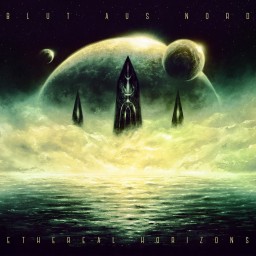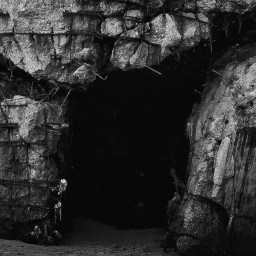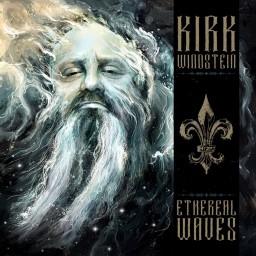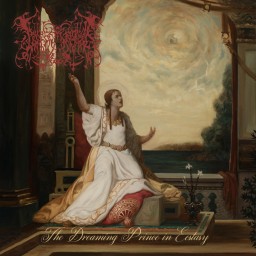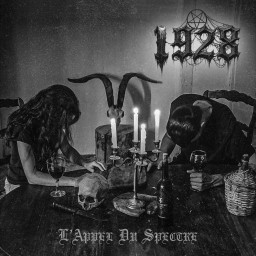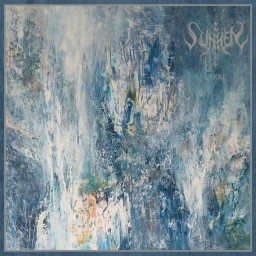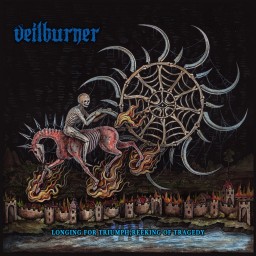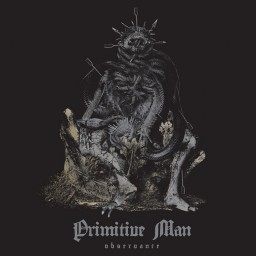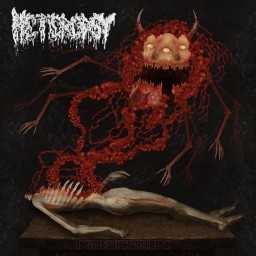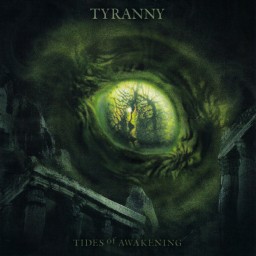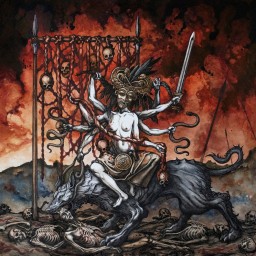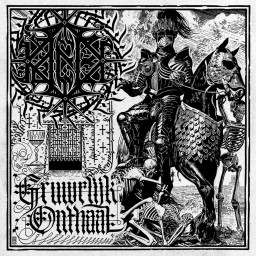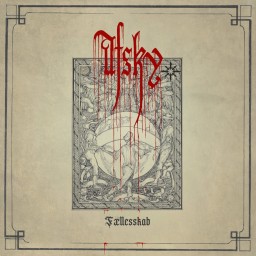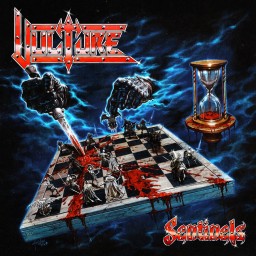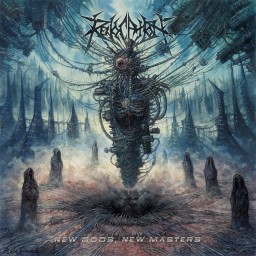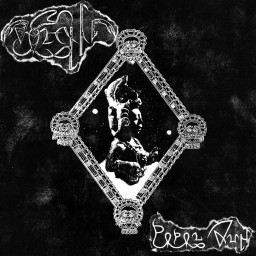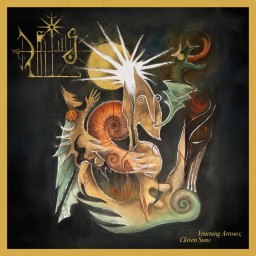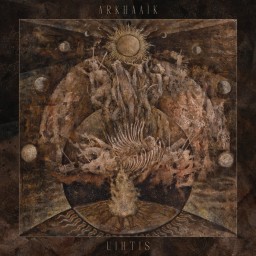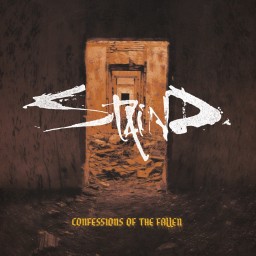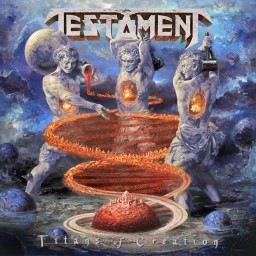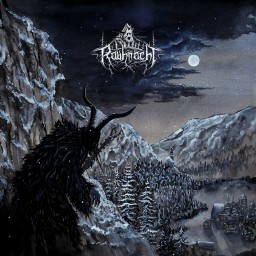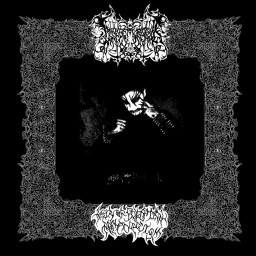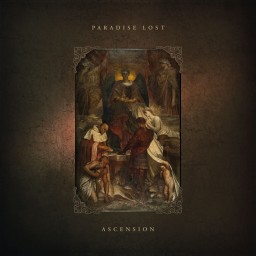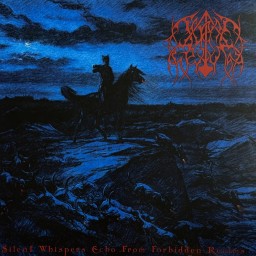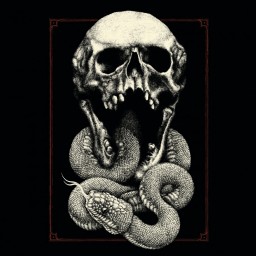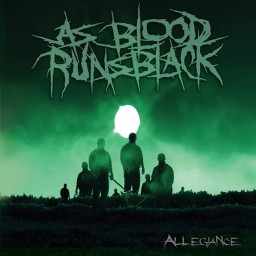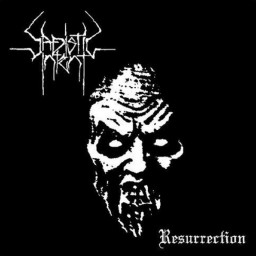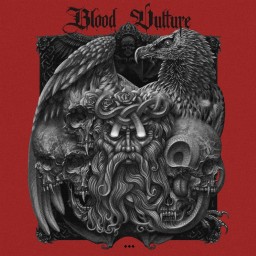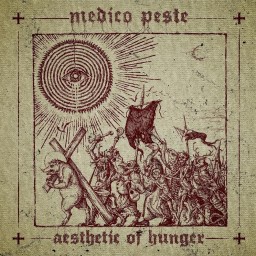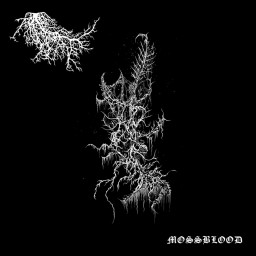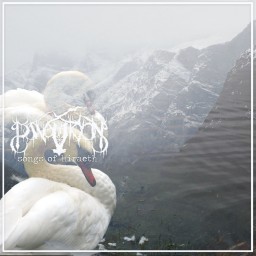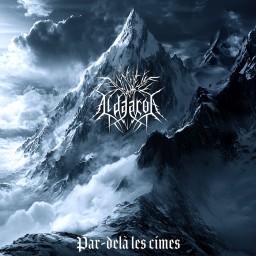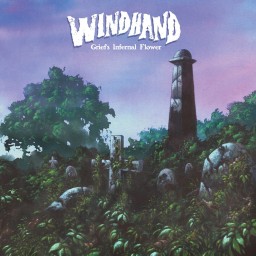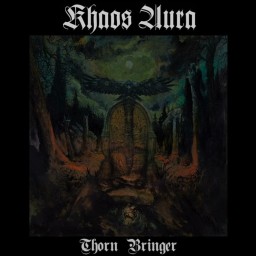Vinny's Reviews
The latest BAN album is not the conclusion to the Disharmonium series then, instead it sounds more akin to the Memoria Vetusta era of the band with its sweeping atmospheric black metal. Devoid of some of the elements that can make the band such a tricky prospect at times, Ethereal Horizons feels like a bit of a safe record in the sense that it does little to expand on the established sound of the band, electing to stick with a tried and tested formula with perhaps a couple of nuances for variety’s sake. As I said in my review of Hallucinogen, there is a sense that BAN can release anything and it would still get lauded from a brand perspective anyways. That probably sounds a bit harsh, especially given the fact that there is nothing wrong with their latest opus, in fact it sounds just as accomplished as anything else they have done. A comparison to any of the Memoria Vetusta records is no shaming benchmark either, but there is a sense of the band now just getting a little too close to that sound on too regular a basis though.
Familiarity should not always breed contempt though. Barring perhaps A Flock Named Murder, The Great Old Ones or (at a push) Veilburner, there are not many releases from this year that can hold a candle to Ethereal Horizons in terms of dissonant expansionism. Granting that the cleaner, post-punk vocals do add a different dimension to BAN when comparing them to any of the other black metal brethren that are active in the same year as one of their releases, the soaring melodies, haunting atmospheres and crisp, clean notes are probably all unrivalled is the brutal reality. Whilst the sound may lack the cold abrasiveness of the black metal of Leviathan, the ambient passages are more than a match for Wrest’s.
Ethereal Horizons plays with a warmth at its heart which is a rare description for a BAN record. I find it hard to source any glacial emptiness for any reasonable length of time across these seven tracks. Instead, I am left with an almost tepid version of Greek black metal, only without the Hellenic temperature being present. The almost electronic nature to the tremolo on ‘What Burns Now Listens’ borders on the serene with its sheer shrillness. In many ways, in the face of this positivism, I do find myself longing for the protracted hopelessness of the 777 trilogy or the sheer avant-garde ugliness of MoRT, let alone perhaps the cold industrial atmosphere of The Work Which Transforms God. Hell, even the second Disharmonium album held a more threatening sound for me to admire.
Despite its obvious qualities therefore, I still find Ethereal Horizons somewhat slips through the cracks somewhat. I cannot fault the effort and will remain respectfully flummoxed at the unfathomable depths of imagination that it takes to create an album like this. The feeling that I have heard so much of it before is nigh on impossible to fight though and hence I am already looking for the conclusion to the much more promising Disharmonium trio of albums.
Genres: Black Metal
Format: Album
Year: 2025
Hot on the heels of my time with the atmospheric intensity of Amenra with Mass V, I found myself embroiled in the more obtuse variant of sludge metal that is Celeste’s 2010 album, Morte(s) Née(s). Well, I say sludge metal, but there is much more on offer here with the ferocious elements of black metal and hardcore present also. Coupled with the unrelenting delivery that the band deploys, Celeste manages to cook up a real treat here. I noted from various sources that the band have a remixed version of the record due out soon that boasts a “heavier, better, darker” version “than the last time”. I have no idea what drove the need for a remix as I find the 2010 version works as it is.
That is not to say that the listening experience has not been without challenges, but some of that is more to do with how I listen to music as opposed to anything Celeste does wrong. I am a pest lately for listening to albums in piecemeal. Whether that is due to a short car journey or a lot of work meetings filling my day, there is a regular risk of me missing out on whole album experiences of late. This “attention creep” affected my enjoyment of Morte(s) Née(s) initially, leading my to falsely believe that the album lacked variety. With such a direct and aggressive approach to their art, failure to pay full attention to Celeste can easily lead to a “sameness” factor creeping into the listening experience if you are just zoning in an out. I will accept that the album is not dripping with variety, but I cannot deny that there is mastery in the control of pacing and tempo that you only pick up on with some critical listening.
Whilst it can be viewed as a very jarring experience, the album never falls into all out-chaos territory. At all times there is a solid percussion section and those buzzsaw guitars possess restraint that is not instantly obvious on the first couple of listens. I think the drums do suffer a little in the mix and that the production job itself does have this wavering edge to the instruments which sounds like the speakers might be going on the blink at times. Yet the impressive building horror of tracks such as ‘(s)’ is so well put together, combining tremolos, big bold riffs and samples plucked out of Hammer Horror that you cannot fail to be impressed.
I would like more of a connection with the album if I were honest. With so many elements that I can lap up gleefully, I do still sense some distance between me and the album to be able to say it is likely to be revisited on a regular basis. I cannot go as far as to say it is alien to me in places, and it could be that some of that “attention creep” that I spoke about earlier is the fault of the album after all. It is hard to put my finger on a bad element though and so the misdirection is possibly due to the combination of parts not hitting my buttons in quite the correct order.
Genres: Sludge Metal
Format: Album
Year: 2010
For an album that is forty-minutes long, Mass V sub-consciously plays as an EP in my head as the run time appears to go much quicker than that over the four songs on the album. I am not entirely sure if this is because I lose presence with it on too frequent a basis, but even under a few critical listens the effect is the same. My overarching impression from my first few listens has been that the balance of styles is well executed. Amenra drop pure doom riffs seemingly from out of nowhere, whilst constructing with studious detail post-metal passages that ease between more sludge-driven moments, still retaining the overall sense of unease in the process of the ebb and flow.
Tracks such ‘Dearborn and Buried’ are real tense experiences, the atmospherics doing little to ease the sensory overload that comes from the consistent sense of threat in the sound. With desperation a key impression that comes out of the listening experience, especially in the vocal department, I feel that I get to this understanding by way of the sense of conflict between the instrumentation and the vocals. If I use a Stoic philosophical comparison to demonstrate. If we consider life as a crashing and bashing tide that batters against the rock (us) and that we must try to remain steadfast in the face of such hardship, then it is easy to bill the deranged nature of the vocals as being the tide on the instrumentation. Given the obvious talent on show in Amenra though, they cleverly switch this to have the vocals remaining strong against the assault of the instruments.
Yet at the same time, if you take the ending of ‘Boden’ as an example, then it is also clear that both elements can be wielded with great effect, creating the tumult of the storm onto the listener who is now being used as the rock in our example. This “good cop/bad cop” routine works well because it avoids being a disruptive force in the musc. With the epic length of ‘A Mon Áme’ deploying an agonising build-up of over ten minutes, I do sense a weakness in the Amenra line. Whilst it is exhilarating when the riffs and percussion do finally ignite, the length of time to get there feels unnecessary in the end given you can easily predict it is coming.
Thankfully, the balance is restored on final track, ‘Nowena | 9.10’ with what is the most Neurosis-influenced track on the record. Clear in its emotional depth, the riff and percussion structures are quite simple in comparison, and this juxta positioning works well. For me, this is the standout track on the album and is a perfect closer to proceedings. So, having come into Mass V in a dismissive mindset following my experience of the two Eps that the band released this year, this record has restored my interest in them. The album possesses an unusual level of accessibility given its chaotic approach at times. The succinct track listing helps this accessibility as well as belying the level of intelligent songwriting that is on display.
Genres: Sludge Metal Post-Metal
Format: Album
Year: 2012
Having completely missed his debut solo outing from five years ago, I can thank the algorithm gods for placing Kirk Windstein’s sophomore effort into my feed suggestions. With 2025 being the year that I finally got to grips with doom as a sub-genre, and with Crowbar being something of an unsung sludge favourite of mine, I soon found myself approaching Ethereal Waves with a heightened sense of excitement. Whilst I cannot profess to being massively in love with Kirk’s vocal style, his riff mentality more than floats my boat.
As expected therefore, Ethereal Waves is stocked full of riffs. Soon enough I was nodding along respectfully, appreciating the Iommi-inspired chugs as they landed consistently in front of me. Not that this is solely what the record I about by any means. Windstein has some straight up heavy metal on display here also which makes for a positive slant on the aesthetic of the album overall. For all the misery that exudes from tracks such as ‘Eulogy’ there is enough mid-paced activity, including an unexpectedly upbeat cover of The Beatles’ ‘Eleanor Rigby’, to keep things interesting. Whilst the doom credentials are hard to ignore on the album, it does contain some depth for the bullet belt and denim cut trad metallers out there.
Having former Exhorder guitarist, Vinnie LaBella provide leads, as well as producing the record, certainly adds character to proceedings along the way. Whilst not exceptional, the solos are able to paint some further emotion into songs, that makes up for the singular style approach that Kirk has around his vocals. Lyrically, the album isn’t all that strong and they do come across as half-baked, if not borderline amateur on a couple of occasions. However, I am not here for the lyrics, more the huge riffs and those enriching leads. During the past few days of listening through this album, I have at the same time been visiting Dream in Motion and I have concluded that Ethereal Waves is a step up from the debut.
Possessing more memorability than its predecessor, Ethereal Waves avoids the need for catchiness still, coming off as a more succinct listening experience as a result. The instrumentation is well balanced across guitars, percussion and keys. The Hammond Organ sound on ‘Rise from the Wreckage’ is an absolute joy to my ears. For all the positives, I still only like the album, I am not madly in love with it. Whilst it most certainly is accessible enough without being mainstream, it lacks any true bite to make it outstanding at any point. We still have a perfectly respectable album from one of sludge metals legends, albeit him showing a softer side than usual in some places.
Genres: Doom Metal Heavy Metal
Format: Album
Year: 2025
“This is the album Drudkh should have released this year.” That is what I wrote in my comments cell in my spreadsheet when listening through the first couple of runs of this album. There are a couple of reasons behind that statement. Firstly, Stworz sounds pretty much the same as Drudkh, vocally and musically. Therefore, it is easy to get stuck in treating U śmierci na komornem as the album the Ukrainians failed to release this year. Secondly, and most importantly, it is much more direct and immediate than Shadow Play. For an artist advertised as atmospheric/pagan black metal and neofolk there is some real grit behind the stylings of Stworz. Think Swan Road era Drudkh and you are (again) at a relevant benchmark. Wojsław, is also one half of Polish atmospheric black metallers, Wędrujący Wiatr and anyone familiar with his excellent work there will not be surprised to hear the quality of his song craft in his solo work. Involved in several other projects, Stworz is his longest running artistic stream. Since 2007 he has produced now seven albums alongside various EPs and splits, easily falling into the classification tag of “prolific” with his musical output.
U śmierci na komornem, flows effortlessly both in-track and across the whole album. Seemingly with an inexhaustible level of endurance, the album just keeps going, workmanlike, for ten tracks over fifty-five-minutes. It is hard to find fault in such a devotional level of commitment to one’s artform when it clearly translates into such quality output. Stworz thinks about balance too. Although the folk/pagan elements are present, they are not forced into tracks. Instead, they complement the more aggressive direction, acting almost as a connection (hook even) to a more simplistic yet endearing form of music. Even the instrumental, interludes work well here, although I note on the CD version the final track is some nine-minutes long as opposed to the near three-minutes on the digital version, so the final track might not be all instrumental depending on the version you have.
We are getting to the point in the year where my top 20 albums in black metal are about to be culled to a top ten, which is a sign of a good year if I am having to narrow that number down. Looking at the other artists in the running, Stworz more than hold their own against the other contenders. U śmierci na komornem matches the passion of Gràb’s Kremess, it drives along the same earthy paths as Havukruunu’s Tavastland, exists in the same atmospheric hue as Afsky’s Fællesskab and carries the same level of maturity so obvious on A Flock Named Murder’s Incendiary Sanctum. Without constructing unfathomable complexity or alienating sounds, Stworz’s album blends styles sublimely. It creates atmosphere without getting into ethereal spaces that come across as lofty or overdone. Above all it feels like it was made for you, the listener. It has personality.
Genres: Black Metal
Format: Album
Year: 2025
Following their debut album from 2021, Malakhim have added a follow up to their discography. My review of their debut, Theion cited a lack of “oomph” to proceedings as being the main spanner in the works on what was an otherwise solid effort. This time around, taking a unique slant on Satanism in the sense that the Devil lives in our very own hearts, singing. The sophomore picks up largely where the debut left off, with the Watain similarities soon easy to pick up on once again. That tempestuous intensity, coupled with the trademark melodicism that is also present makes for a great combination.
There is a timeless nature to black metal in general. With so many artists and albums available in just a few clicks of a mouse it is easy to get lost in the glut of repetitive releases that make up this genre of metal. What releases like And in Our Hearts the Devil Sings can do though is show us that there is nothing wrong in framing something established (there’s no reframing happening here) if you can balance that well executed musicianship and quality song writing. There is a sense of individualism to each of the seven tracks on the album. All still play their part in the overall album experience, showcasing that all too familiar black metal beast that fans of the conventional form will know and love. However, there is a strength that rarely yields across these tracks. This gives the album a sense of completeness. As such this is a very consistent album, built on very firm foundations that can endure the weight of its own expectations that it sets very early on in the record.
The missing “oomph” that I levelled criticism at their debut for misplacing has most certainly been added this time around and it is always good to see a band grow from release to release. Tale the second track, ‘Solar Crucifixion’ that goes with a blinding intensity level from the off but achieves great balance as it goes, placing a suitable reduction in pace appropriately before resetting itself back on the hellish path it first ventured out on. Whilst I would struggle to apply the word “epic” to any of the tracks here, there is certainly a sense of grandeur glancing across some of the songs, with album closer ‘The Firmament Submits’ being a particular high point on the record. Unafraid to embellish songs with leads, Malakhim do so without diluting the darkness that their music generally conjures up.
I can only hope that the band continue this upwards trajectory on future releases. Adding to both the power and the quality of their music shows that Malakhim are certainly going in the right direction. All eyes (well, mine anyway) on album number three then.
Genres: Black Metal
Format: Album
Year: 2025
If there is one modern black metal act that I am guilty of neglecting, it is Lamp of Murmuur. Barring a brief flirtation with his debut and a cursory listen to Saturnian Bloodstorm, I have never really invested much time in one of black metal’s most talked about acts of recent times. Buoyed by the two singles that came out ahead of the new album, I made a note to ensure that I listen through the latest offering with a consciously critical ear. Amidst the dashing keys and chimes that accompany the riffs and grim (if not somehow watery sounding) rasps there is clearly more going on than any simple black metal album and so a critical ear is very much needed for this one. Background music this is not.
The Dreaming Prince in Ecstasy bases its core sound in the rudimentary elements of black metal. Embellished with the symphonic flourishes of Emperor it still retains the attack of Immortal whilst maintaining an often-simplistic approach to riffs. Where things do get interesting is when the post-punk elements come into play. Now, I personally enjoy post-punk and do have a few albums in my collection. The connection to black metal is not hard to make from a thematic perspective with angst, repression and societal decay (to mention but a few) being common across both sub-genres. That is not to say that LoM get the inclusion of this style correct in my view. As much as I accept that clean vocals can have their place in black metal, there placement on this album does feel off at times. Adopting that familiar Attila crooning style that I picked up on in the debut album, LoM again deploy this style here alongside some more cleaner singing. The cleaner parts work well on the more post-punk obvious tracks (‘The Dreaming Prince in Ecstasy Part I – Moondance’ & ‘The Dreaming Prince in Ectasy Part II - Twilight Orgasm’), yet there is a couple of occasions when they feel invasive and detract from the enjoyment of the track.
Overall though this fusion of styles is refreshing and is well balanced enough to still make this feel like a cohesive opus. Would the three tracks that make up the component parts of the title work as a standalone offering (as an EP, for example)? Hell yes. However, by being included on the album they show the variety available in the LoM arsenal. The lead work on Part III is sublime in a post-metal styling, yet the vocal element is classic Emperor to my ears. The more ambient parts are the only part of the album that is lost on me really, but even this may grow on me with repeated listens. It is just a shame for me that the album ends on a sour note since it is an acoustic number that stands out as being of different character to everything else present on the record.
Genres: Black Metal
Format: Album
Year: 2025
Featuring Brouillard from many other projects in the black and doom world (Alukta, Les Légions du Déclin, Transcending Rites...the list goes on), French duo 1928 give us all a respectful nod to the old school with this their debut full length album. Following on from their 2024 EP, Les meutes séditieuses this album is advertised as raw French black metal. In reality, I have heard rawer, but that's not to say that the conventional black metal that is coupled on occasion with some black 'n roll isn't thoroughly entertaining. There is a lot of heart behind what 1928 put together here and it is clear where Déclin and Brouillard's passion lies. Whilst this release does not quite keep up with the likes of Altar of Woe from this year, the intent to do harm is clear and present at all times.
With an album cover not dissimilar to the 2021 album by Spectral Wound, A Diabolic Thirst 1928 possess a similar potency in their attack without quite straying into the more melodic teritory inhabited by Canada's black metal terrors. With Brouillard on vocals, she rasps and howls her way through nine resplendent tracks of black metal. The album detail I have does not specify who plays what on the record in fact. Whomever it is who is howling their very soul out, props to them. The punky/black 'n roll riff that opens ' Le royaume incondé' catches you off-guard at first but then the track soon settles down into a mid-paced mauling before increasing the tempo later in the track. In short, 1928 keep things interesting.
Opening the album with a short burst of the French national anthem is another unexpected moment, and one that threatened some concern from me in that this was going to be a theme for the album. It isn't. This is perhaps one of the more immediate and direct balck metal albums of 2025 if I am honest. These two aren't here to fuck around after all. If I am being picky, I think it could benefit from a more raw sound than it has, and I acknowledge there is a decent level of rawness here already. I think the direction here is clearly supposed to be a dark and scathing one and the production job does not necessarily do justice to that ethos. Still, I cannot shy away from what is still agreat record though, and on which has been on rotation for a solid couple of weeks already.
Genres: Black Metal
Format: Album
Year: 2025
Listening through Vemod by the now sadly defunct Solbrud earlier today, I was struck by how such rich textures could be created from such chaotic sources. With a sixteen-minute plus length track sat during the record, it is testimony to the quality on display that my attention could be held for the entire duration of the track. This incursion into Danish black metal reminded me that I was overdue another run through of the latest album from fellow Danes, Sunken. Lykke is made up of tracks that are all over the ten-minute mark, and so my earlier session with Vemod served as good training it seems.
Sunken occupy a more atmospheric space than their fellow countrymen and as a result their sound has the requisite expansiveness that one would expect from such a style. Lykke successfully combines the misery of DSBM in the vocals with the vast open spaces that get conjured from the music of WITTR. The harrowing vocal performance on ‘Og det er lykke’ that contrasts with the atmospheres of the track gives a real sense of the futility of howling into the void. Yet at the same time it is impossible to deny the comfort I find in those very same textures. In fact, the album title translates in English as “happiness”, which is one of the rarest of emotions to explore in black metal. However, Sunken do this to great success I feel. My overall experience of the record is that I find it a very uplifting experience.
The Afsky influence is there (the band shares live members with Afsky) but there is a lot more density to this record. The weight of the ocean is obvious in Sunken’s sound. This is an album of unfathomable depths that does not assume darkness to be the overarching theme to such unseen realms. Whilst melancholy is certainly one of the key themes of the sound, it is not entirely painted in noir shades. The grey instead facilitates reflection within that pensive sadness, as opposed to just blind acceptance that it is happening, regardless of often not knowing the cause. Take a moment to revel in the glory of ‘Glædesfærd’ with its slow to mid-tempo balancing the weight of this emotion perfectly.
Over the past year, I have become more interested in Danish black metal, and Lykke is one of the albums that typifies why I find it such an interesting scene. Whilst I cannot deny the size of the sound that is present, it possesses real subtlety at the same time. The immense opening of closing track ‘Når livet går på hæld’ stays with me long after the track and indeed the album has finished. This experience is common amongst the Solbrud, Afsky, Gespenst and Glemsel releases I have listened to recently, all of which leads me to believe that Denmark is a gem of a country for black metal that needs further exploration.
Genres: Black Metal
Format: Album
Year: 2025
Veilburner seem to occupy the same rarified atmosphere within which I would normally encounter Blut Aus Nord, Dødheimsgard, Deathspell Omega or even Oranssi Pazuzu. They are distantly rooted in black metal yet at the same time are multiple football fields away from the genre. On the death metal side of things there are comparisons I could draw with Akercocke and Portal, which are fine benchmarks to be scored against. With this being my first ever listen to the band, my early impression was that this was not a duo that was with or indeed without their own sound or style. The mish mash of influences that had leapt out at me from what at the time of typing this had been just four tracks was intriguing to say the least. Yet, whereas on other, more avant garde releases I would have either hit the skip button multiple times or simply switched off altogether, there was something that kept me in the room with Longing for Triumph, Reeking of Tragedy.
Now, it could have been that after consecutive days of listening to conventional black metal, I was just more open to something different. Those dissonant tremolos certainly made short work of the seconds as they danced chillingly along my nerve-endings, whilst those squally riffs seemed to rapidly grow a horrifying backdrop of noise for the more extrovert elements to sit atop of. Yet for all the individual elements that are in play at any given time, I have found it very easy to plot my way through the tracks as they pounce on me. There is also enough memorability to them to permit me to understand them as isolated pieces as opposed to the album becoming just one chaotic glut of noise. A more critical listen leads to me to think the reason for this is that the tracks themselves have very clear points of progression. This is perhaps too hard for me to explain in words for some readers, but riffs have a clear start and end to them. Sounds odd I know, yet this element of closure gives me traceability across what could otherwise soon become a disorientating affair.
This succinctness that sits behind the dissonant and transcendental apparitions that are conjured by the rest of the music acts as an anchor almost. I feel that because of it, I can truly pay attention to all the album much better. As a fan of BAN, Deathspell Omega and Oranssi Pazuzu already, there are elements here, such as the vocals, that are not offering anything new most certainly. The admiration comes for the crafting involved in putting all eight of these tracks together. Thematically exploring trauma, death, infinite reincarnation and the desperate futility of lives that make the same mistakes and meet the same end, this is not the most cheerful of subject matters to be committing to tape. Such ideas remind me very much of Akhlys, who are one of my favourite artists over several releases now.
Yet, the more I listen to the album the more I find it veering away from pretty much all the territory I have called it out for inhabiting already. The rich lead work of ‘Ouroboreal Whorl’ and ‘Matter o’ the Most Awful of Martyrs’ have an almost post-metal level of clarity to them, for example. There is a seemingly purpose-built level of tameness to the record that only reaches the surface with repeated listens, and I find that remarkable for such a challenging piece of music, yet I have already called out the concise nature of part of the album already. Longing for Triumph, Reeking of Tragedy is the perfect album title for the work on display here. The record is a triumph yet achieves this with no loss of that sense of stinking human tragedy.
Genres: Avant-Garde Metal Black Metal
Format: Album
Year: 2025
Poland is at it again. Producing great black metal is hardly a rarity in terms of a country that has Mgla and Deus Mortem to answer for. Martwa Aura deploy the production skills of Mgla/Kriegsmsachine maestro, M. for Lament, and a mighty fine job he does too. This is another blend of intense black metal that permeates any room it is played in, coating the walls in its acrid output, teasing melodies into the ether like a gang of insane dancing imps. Chiming guitar melodies haunt tracks such as ‘Lament czwarty’, whilst spoken word vocals appear here and there to help induce meditative states in the listener. All performed against a solid background of percussion, dashing tremolos and rasping, venomous vocals.
I was familiar with Martwa Aura following their last album from five years ago. Morbus Animus was a four-star album in the end, and it is pleasing to find Martwa Aura picking up where they left off on that album with Lament. There is no doubt from the beginning of opening track ‘Lament pierwszy’ that the band are on the attack, with this riffy little number firmly lining up what to expect from the rest of the album. Unafraid to be creative, these Poles hint at an almost post-punk style to the clean vocals on ‘Lament piąty’, whilst the rest of the track is a certified black metal banger. Gregor’s vocals can take on a real demented edge at times which underlines the urgency in the tone of the band’s sound. Martwa Aura’s music sounds pressing to the point of being smothering. It is in your face all the time, there is no hope of this being background music whatsoever. This is front and centre of your world for the duration of the record.
There is a fine selection of leads to pick from alongside all these riffs, and these blooping and looping melodies enchant and enhance the overall album experience perfectly. Forty minutes in the company of this record just flies by and before you know it you are being pulled through the final throes of the only track that does not conform to the “lament…” prefix. ‘Morbis Animus II’ seems to be a missing track from their previous album that has parts I & III in the track listing. This track is perhaps the slowest tempo on offer here and is almost a palate cleanser for the album to close with when compared to the primal intensity on show for the rest of the release.
Genres: Black Metal
Format: Album
Year: 2025
I have been slowly building focus on the black metal scene in Denmark. Having soon come across the likes of Afsky, Sunken and Solbrud, my attention was quickly alerted to Kold. A little-known duo who to date have released two full lengths, Kold have proven to be quite the discovery. With nods to WITTR in their sound, Kold also have a very modern take on their black metal, venturing into post and gaze territory (although thankfully not too much of the latter). Whilst similarities could also be drawn with Afsky, this pairing have a more restrained approach overall by comparison. The melancholy in their music really resonates through the notes on the guitar, yet they can also keep pace with the faster elements of black metal (check out ‘Forvitet Fortid’).
It was obvious from my first listen to Det falmede håb that there was something special about this record. My early alarm at the clean and gazey section on ‘Alt vi havde kært’ was unnecessary as this style is isolated to that fifteen-minute track and there is much, much more to savour in this lengthy performance alone. Kold are masters at shifting effortlessly from these cleaner, more melodic passages into the frenzied aggression of conventional, atmospheric black metal. Wielding melody with much the same threat as they do with their more intense movements, Kold deploy climbing riffs, soaring tremolos and icy crystal cut atmospheres to great effect. Even though most of the tracks are well over six-minutes, the total fifty-minute run time does not ever feel bloated or overdone.
Fans of Paysage d’hiver will recognise some of the tricks borrowed from the Swiss maestro here. The Kold sound is full of winter with more than an element of astral projection swirling around in the darkness also. The consistency levels across Det falmede håb are remarkable. As such, this is perhaps only the second album I have ever listened to that I can truly say I never want to end. I get utterly lost in its enduring majesty and can never stop marvelling at the attention to detail involved here. Driven by a clear passion for their artform, Kold have a real fire about what they do and this translates to an almost resplendent level of entertainment for me.
Genres: Black Metal
Format: Album
Year: 2025
Primitive Man vocalist and guitarist, Ethan Lee McCarthy recently described the figure in the artwork for the bands fourth full length album as being indicative of him holding onto a snake that represents his struggle with depression and how for some days, he must hold onto that snake to stop it from getting out of control. If you needed any introduction to OBSERVANCE, then that’s about the best summary for what awaits us all on the seven tracks the Denver trio have committed to tape. Anyone who has caught sight of the disturbing video to lead track ‘Social Contract’ will have had a sneak peek into the truly horrendous view of the world that Primitive Man have. Their latest album does nothing to enlighten that outlook, despite it being billed in some quarters as their most positive album to date. Make no mistake folks, artistic flourishes aside, this is ugly music for equally ugly times.
The seemingly unfathomable depths of the cavernous vocals of ELM echo around the empty abyss of ignorance, division and hatred present in many of our societies today. Once again deploying noise alongside the sludge and doom elements, OBSERVANCE sounds like a modern record. It emits a sense of being written against a backdrop of real-world problems, and of that real world being oppressive and lacking any visible semblance of goodwill. The jangling guitar for the first three-and-a-half-minutes of ‘Devotion’ sounds like an extended noise rock intro that runs for a torturous period. For some listeners this might go on for too long, but it’s almost inescapable presence is representative perhaps of the things may of us cannot hide from. Broken relationships in broken neighbourhoods in a broken society.
Embracing OBSERVANCE is perhaps the only way to truly be able to pass any judgement on it. It is genuinely like the snake that ELM describes, except for the listener this is not something for us to hold any sense of control over. I can connect with the imagery, just as I can the music and as such, OBSERVANCE is already on a solid footing within a matter of just a couple of tracks. Like the Mares of Thrace album, LOSS from earlier this year, even though I cannot in all honesty allude to experiencing on a personal level much of what makes up the content of these tracks, despite these cultural, social, political and emotional differences, I attain the human sense of their importance to Primitive Man and their wider audience.
Credit must go to the performance of drummer Joseph D. Linden. His patterns follow their own free will for most of the record. If anything, it is the riffing consistency that provides traceable rhythm on the album. Often when listening to the album, I have found myself playing some kind of cat and mouse game with the drums. Expectant of a hit, only to be caught out by another less than predictable expanse of percussion. For a band who base a lot of their impact on repetition, this is truly an unexpected twist. I cannot neglect to pass comment on the importance of bassist Jonathan P. Campos either. His rumbling and brooding bass is the real underlay to the hellish textures on which OBSERVANCE treads. The “new” elements of melody and lighter tones are not as obvious to me, having never listened to a full-length from PM before this. I would be lying if I said that they standout for me, even after multiple listens, as being noteworthy. That is not levelled as a criticism either, more as a reflection of how well everything does fit together on the album.
A lengthy album justifies a lengthy review it seems. There is a sense that OBSERVANCE has lots more to it that I could describe but, in the end, there is no getting away from how gloriously bleak it is. Although I would hazard a guess that for some this barrage of hopelessness would be too much, I doubt anyone familiar with PM is coming to this record expecting spade after spade of positivity.
From ‘Natural Law’:
With the holiest gasoline in the sea
I will burn their ships down
A prayer of hatred, a spell of revenge
Genres: Doom Metal Sludge Metal
Format: Album
Year: 2025
Japanese doom death merchants, Heteropsy (interestingly meaning relying on the observations of others who have previously examined something) have only released EPs to date. Embalming is their first full length after five years of existence. Based on the four listens I have now completed with the record, those five years have been well spent, honing and developing a potent sounding death metal sound that embraces a multitude of influences. Often, they will switch up styles mid-track, exhibiting a degree of skill in doing so very cleanly. They aren’t many modern death metal bands kicking about that can deliver what Heteropsy do, let me tell you.
Upon first listen, I was unsure of there being much in the way of doom death credentials. I located very quickly the Swedish death metal crunch in the riffs, obviously. What I did find myself wondering was if they were cloning fellow countrymen, Coffins. If I am honest, I have very little experience of Coffins and so I am spinning a few of their tracks whilst I write up this review. Similarities exist, yes. However, there is no cloning happening here to my ears at least. I am impressed by the variation on show during Embalming more than anything. It is much more than just a doom death record with some nods to Swedish death metal. There is a distinct heavy metal vibe to some of the leads (as early on as the intro track in fact) and the quartet’s palette stretches to incorporate frantic death metal on the likes of ‘The Sodomizer’, a true doom death trudge on ‘Asphyxia’ before sharing some exquisite Autopsy squall on the same track also.
The band describe their sound as “mourning death metal”, a mix of their favourite death metal sounds. Whatever the moniker is that is being adopted to describe their sound, Heteropsy know how to blend their influences superbly. Whilst overall I sense their pacing is less laboured than Coffins, they can still conjure up transcendental guitars on my album highlight, ‘Memento Mori’ as well as creating a superb atmosphere during the build-up on ‘Methadone’, combining slow picked strings and white noise to great effect. The album artwork is the only real area of concern of me but that shaves nothing of the rating here. The scores are kept away from perfection by a couple of tracks that seem to meander a bit. ‘Seventh Damnation’ takes its sweet time to get going and even when in full flow, still seems to flounder somewhat. Album closer, ‘Old Friends’ heralds equal, unrealised promise too unfortunately. Still, for a debut record, there is plenty to marvel at.
Genres: Doom Metal
Format: Album
Year: 2025
If I were to give anyone an album that personified the very definition of funeral doom in my opinion, I would point them to this record. Quite unexpectedly it has become one of my favourite funeral doom albums that I have heard during my still relatively short tenure in The Fallen clan. What Tides of Awakening captures superbly is atmosphere. When I play the opening track, ‘Coalescent of the Inhumane Awareness’ it creates pictures of a dense fog or mist, seeping into all the parts of my life I am uncomfortable or unhappy with, shrouding them in a dense shroud of calming, almost sensual melancholy that acknowledges their prowess but refuses to let them have prominence at this time. That haunting guitar melody seeps through in the background, adding threat and menace to proceedings.
This therapeutic effect was entirely unexpected going into the album and I do not doubt that this is probably an experience that is isolated to myself only. It is great though when an album connects with you, especially when you least expect it to and it causes you to reflect on your wider existence as well as being able to enjoy the quality of the performance as well. Now, it matters not to me that the drums have only a minor presence on the album. I would go as far as to say the album would not work anywhere near as well if they were more prominent in the mix. They act somehow as an additional atmospheric effect, which is not something that I thought I would ever say to describe the sound of drums. It is the vocals that have the largest impact for me though. They are well balanced in the mix, retaining presence without spilling over into dominating proceedings. Whilst they may be the focus of my attention, they are still very much a component part of a much bigger machine.
Whilst it would normally be a problem for me, the fact that I cannot distinguish between tracks works for me here as I am utterly enthralled from the off. It plays best, in my head at least as a singular track experience with only the final track having that more ambient style that separates it from the pack. You can all just leave me here having my own private therapy session with this month’s The Fallen feature release.
See you all in December.
Maybe.
Genres: Doom Metal
Format: Album
Year: 2005
Iceland. The country of volcanoes, hot springs, the Northern Lights and black sand. Add to this list black metal of course, more specifically black/death in the form of Reykjavík’s Nexion. With their sophomore album, Sundrung (disharmony, discord or sundering), this five-piece are showing clear signs of hitting their stride early on in their recorded output. Simply put, this record is monstrous. Monstrous in the sense that it has nothing but wicked intent. Monstrous as in it sounds like some crawling beast that is literally dragging all the tortured souls of hell and Hades’ underneath every one of its groundings. If ever a benchmark for true black/death metal is needed then there is a perfect, modern reference sat right here.
You can easily find comparisons to a whole host of other Icelandic metal bands present in Nexion’s sound. Svartidauði, Misþyrming, Sinmara, etc we all know the key players out there. Yet you will also find a host of other influences on Sundrung. Vocally, on more than one occasion, I hear spurts of Tom G Warrior as Josh Rood goes through his range of scathing, blackened styles against a backdrop of dissonance that would not be out of place on an Ulcerate record (‘When Raven Steals the Sun’, being a great example of the dissonance effect). There is variety to in the track arrangement, with atmospheric interlude ‘:Þþþ:’ acting as a fetid palate cleanser in the middle of the album before the horror resumes with the distinctly black/death n’ roll opening of ‘Hymn of the Valkyrjur’.
Chanted or layered vocals seek to only add more mystery and intrigue into the ritual that it is this album. The frenzied attack of ‘Rending the Black Earth’ does not lose any sense of solemn ceremony during its glorious assault. Mining tremolos resonate throughout the track creating enchanting dissonance as they blare like victory horns across a shattered landscape. The sense of foreboding never leaves Sundrung over the eight tracks that make up its forty-eight-minute run time. The tension is masterfully poised by the band throughout which is an achievement in itslf given that its nefarious intentions are always firmly on display also, leaving the listener in no doubt of what they are dealing with here.
The only criticism I can level at Sundrung is the lack of strength in the drums, which is not something that necessarily wounds the album beyond repair, yet it still is a weakness that is obvious in what is otherwise an incredibly strong album. Arguably, with a twin guitar attack set against those vocals, you should expect something to get lost, but when it is an important component such as the drums then it does have an obvious impact.
Genres: Black Metal
Format: Album
Year: 2025
Dutch black metal quartet, Kaeck kick off their suitably named third album, (translated as) Horrible Welcome, with a horrible sounding track. ‘Door gespleten tongen bezworen’ (‘Conjured by Forked Tongues’) is a real dank sounding piece of black metal, punctuated by stabs of synths that could accompany crawling shadows in any Nosferatu flick in days gone by. These keys are a key component of the albums sound. Creating atmosphere against the barking guitar that growls like a pack of hellhounds, this adds authenticity to the sound most certainly. In using them, the album avoids embarking on a truly symphonic experience and can focus on generating a real sense of horror instead.
The downside is that it soon gets old. Now, I know that nobody listens to conventional black metal for masses of variation, but Kaeck are on their third album here and as much as I admire them for sticking with a tested format, the issue here is that the tracks soon all start to morph into one. Whilst I accept that the pace and tempo do alter throughout the record, the keys end up just droning on in the background. Sometimes, they aren’t deployed fully even and whilst this I could argue gives a bit of respite, it does unfortunately come across as if the keyboard player is just falling asleep and coming back in between power naps.
What starts out as a promising album therefore soon fades into obscurity, and I can’t help but feel a bit robbed. Even though I acknowledge that Kaeck can create a ghastly black metal sound, they just don’t do enough with it to hold my interest. After four tracks, I could guess the structure of the remaining three, very easily. If you like your bm to be based on pure repetition alone, then this one is most definitely for you. Ultimately though this gives very little reward otherwise. Fair play for trying to recreate those early 90’s eerie vibes but the authenticity of that over three decades after the event is questionable.
Genres: Black Metal
Format: Album
Year: 2025
For the first ten or fifteen seconds of the new Afsky record, the listener can be forgiven for wondering just what the hell they have gotten themselves into. Bright sounding, female vocals kick off the opening track, sounding to all intent and purpose like some foreign pop group has sabotaged the expected black metal opus you have just clicked play on. Thankfully, it is but a ruse. Soon enough the familiar coldness sweeps into the sound as Afsky treats us to an epic opening tremolo, the kind that vibrates your teeth together as it goes on for the best part of two minutes. Fællesskab has a feeling of the grandiose to it from the off really. This cinematic edge to proceedings with explosions of riffs (check out ‘Den der ingenting ved tvivler aldrig’), howls of ghastly despair and rich, undulating melodicism all makes for one hell of a listening experience.
Possessing the earthy tones of Drudkh and the atmospheres of WITTR, Fællesskab might be Afsky’s best effort to date. Ole Pedersen Luk, to give him his proper name, once again handles everything on the record giving a fantastic acquittal of himself in the process. He drops in some traditional metal sounding moments along the way that sit effortlessly alongside the more traditional black metal fare on offer. Afsky’s high-pitched vocals are toned to bring the cold in at a second’s notice, and so when things get a little too far away from the black metal roots, he’s there with his shrill vocals to bring the temperature back down to a suitable level of tundra. The tremolos have a folk style to them, an almost warbling sound in fact, and as a result they seem to swirl in the air around the listener like bastardised songbirds.
With no track under six minutes in length, the forty-five minute run time feels full yet not bloated. Albeit far from a Marduk level of intensity, the record does have a sense of charging momentum to it. The pace of the attack that opens ‘Arveskam’ is a good reference point for this. There’s a balance to the tempo here that keeps the energy but introduces the melodies at the same time. Having referenced Drudkh earlier in the review, I would say this is a much better album than Shadow Play. It has a more direct approach, resulting in more potency in the riffing. The bell tolls of ‘Flagellanternes sang’ herald a superb, morbidly melodic bm track that is positively spellbinding. Fællesskab may not be the darkest, most glum black metal release of the year but it is the most exciting for sure. Four records in and Afsky is really hitting his stride with his maturing brand of black metal. I am unable to point out criticism on Fællesskab, making it a strong contender for AOTY in my book.
Genres: Black Metal
Format: Album
Year: 2025
I think it was possibly Knife’s debut album from 2021 which would mark the last time a speed/thrash metal record showed enough vigour and intensity to make me stop and take notice. For all the talk of regurgitation of old ideas, themes, styles and genres in modern metal, it is the likes of Vulture who give me the assurance that, if done well enough, the old-school can be worshipped and not come off as simple plagiarism. Whereas their fellow countrymen in Knife deploy a blackened edge to proceedings, Vulture are all about the shrieking, banshee wailing style of speed metal that you would associate with the likes of Razor or Exciter. Perhaps bordering on the power metal elements of Agent Steel also along the way, these Dortmund residents certainly know how to wear their influences on their sleeves.
Above all else, Sentinels is fun. It’s 80’s horror flick style album cover perhaps denotes a band with serious intent and I am not intimating for one minute that Vulture are a goofy band, more that they approach their art with a genuine enthusiasm, a passion that bleeds into their music. Leads soar over galloping riffs, vocals pierce the ears of anyone within a mile radius, yelled from lungs that swell with pride as they sing each lyric, and all the while the drums “thunk” along in the background. Never coming across as having much in the way of venom or bite, the drums are the most understated instrument on the record, to my ears at least. However, this is not necessarily a criticism as I think the production job does the sound real justice overall. Clean without being overproduced, the album has an atmosphere of a band playing live almost.
This is not my first venture into Vulture. I gave their 2019 album, Ghastly Waves & Battered Graves a four-star rating back in August of that same year, and I find Sentinels to be in the same ballpark of the ratings, albeit that I sense a step up in quality of musicianship, certainly in the leads department at least. I am not a massive fan of the hi-pitched vocals that are used here, although my tolerance of them during my listen through of this record was surprisingly good. It is the fiery riffs and blinding leads that reign supreme over the record for me though. The inclusion of an instrumental at track seven seems a bit of an odd choice if I am honest, and I struggle to fight the feeling that it is little more than filler, despite its best efforts.
Leave me with tracks such as the rampant ‘Death Row’ and I am much happier though. In fact, the section of the album that follows ‘Der Tod trägt schwarzes Leder’ is probably the stronger part for me. There certainly feels like an uptick in the quality for me over this backend of the record at least. Keep flying the flag for the old school fellas, it is appreciated.
Genres: Speed Metal Thrash Metal
Format: Album
Year: 2024
New Gods, New Masters is one of only a handful of death metal albums that I have entertained over the course of 2025. In a year that has only seen me focus on death doom as part of my discovery of new music in The Fallen clan, conventional, technical and progressive death metal has not been on high rotation over the past twelve months. If I am honest, Revocation hadn’t piqued my interest with any of the previous releases I had heard, although I cannot say with hand on heart that I recall listening to a full length of theirs in recent history. It was upon hearing the chug fest that is ‘Confines of Infinity’ on an interview with Dave Davidson that my ears pricked up to the promise of some hard-hitting death metal. Seeing that one of my death metal heroes, Luc Lemay was making an appearance only enhanced my urge to give New Gods, New Masters a listen.
Now, I cannot pretend to be a massive fan of technical death metal. Despite owning all Death albums on physical format, I do have to be in a particular mood to put on Individual Thought Patterns, for example. Whilst my guard was up going into this Revocation record, having heard many times how proficient a player DD is and fully expecting an expansive wank fest as a result, I was surprised at how riffy New Gods, New Masters is. Even the technical and progressive mastery is difficult to not be impressed with, to the point where my admiration even extends to acknowledging who well controlled those potentially alien elements are throughout the album. I will not pretend some of those dashing and clipped riffs that kick off ‘Sarcophagi of the Soul’ do not irritate me though, and I much prefer it when the track settles into more rhythmic territory.
Guests appear to have been queuing up to perform on the album with the likes of Travis Ryan (Cattle Decapitation), Jonny Davy (Job for a Cowboy), Luc Lemay (Gorguts) and even jazz guitarist, Gilad Hekselman making contributions to the proceedings. Surprisingly for me, it is Travis’ track that I find the most appealing of all. ‘Confines of Infinity’ has an infectious, hacking riff to it that contrasts with the more chaotic main parts to the track which also makes good use of some groovy riffs to temper the song back to that main riff. Leads/solos all have a crispness to them, and they benefit from the production job of DD, as you would perhaps expect. I am not as enamoured with the drum sound though, that instrument sounds a bit lost in the mix. The presence of Ash Pearson is still, somehow, unquestionable despite this injustice, and he gives a good acquittal of himself regardless.
I am pleased I found so much to enjoy from this record. It proves that there is still some interest in death metal for me beyond the confines of the more gloomy and funeral doom styles that I have focused on more this year. Retaining some of their death thrash elements of old most certainly has helped me with being able to connect so easily with this record also. The longevity factor remains in question for me, but for now I will just enjoy it whilst it lasts.
Genres: Death Metal
Format: Album
Year: 2025
Popol Vuh is a total sonic assault on the senses for those who dare to delve into this latest release from the renowned main persona of the Black Twilight Circle, Eduardo “Volahn” Ramirez. It is a complex blend of atmospherics, scathing black metal and indigenous sounds that can be traced back to the Mesoamerican civilisation, the Mayans. Sang entirely in Spanish, these six tracks leave very little room for breath, charging at the listener with an unrelenting fury that is as dizzying as it is terrifying. Popol Vuh is quite the disorientating experience at first, and it took a couple of listens for me to grasp what was going on and understand that despite the raging intensity of the pace, it is a well-balanced record.
This is an album that sounds evil. Reminiscent of the smothering soundscapes of Akhlys at times, Popol Vuh has its roots embedded in the true extreme foundations of the black metal genre. From a guitar perspective, it rarely involves melody when it comes to laying down the grounds of its attack. Favouring acoustics for any requirement to bring the record into less offensive sounding territory, it is the use of native instruments that really sets the sound apart from probably most of what the average black metal fan has heard so far this year. Couple all of this with the icy sonics of Paysage d’hiver and you soon come to an understanding of the quality on offer here.
Absolutely resolute in its Mexican nationalism, this album commemorates “the anniversary of the Spanish defeat at the hands of the triumphant Guatemalan warriors” and heralds “the twilight of Mexican Independence”. The sound of the album portrays superbly the tumult of the history it shares and is delivered with a clear passion. There is a sense of mastery to the album that usually comes when the traditional instrumentation of an ancient civilisation is played so well alongside such an extreme facet of music as it is here. There is almost an astral element to Popol Vuh that I was not expecting to hear at the outset and as such it is an album that has caught me off guard in terms of how much I have ended up enjoying it.
Genres: Black Metal
Format: Album
Year: 2025
The loosely described “experimental black metal” of Arrows offers a different side to the Jünger Tumilon music collective that explores a much darker aesthetic. Retaining those death doom elements also, Yearning Arrows; Cloven Suns still packs a hefty punch and infuses this brevity of riffs with a level of horror atmospherics to really mix things up. It is hard not to be terrified at various points of ‘At War with Peace’, blending tribal elements with more progressive elements and a driving rhythm too boot, this is a massive track on what is only a(nother) four track release. The clean vocals that are used here fit perfectly into the menacing fade of the track, suggesting this battle is still ongoing long after the record is finished.
Arrows have synths and they are not afraid to use them. Stabbing atmospherics into songs like devilishly sharp blades into flesh, they accompany the guitars perfectly whilst building tension well at the same time. The main point of interest in the sound of Arrows though is the bellicose vocal style that gets used intermittently throughout the record. Clean vocals can be made to sound threatening and this approach is a perfect example of this being done to good effect. I did find this element to be leaning on the too quirky side of things at first. However, I soon found them to be more of a unique identifier in the sound of the album. Darvish and Menetekel share vocal duties, cleverly giving this variety into proceedings without making it sound forced as I suspect it would if one vocalist tried to flex their style.
It is clear to hear Arkhaaik in Arrows, given that all three band members on Yearning Arrows; Cloven Suns are the exact same trio who put together Uihtis this year. What a wonderfully busy and experimental 2025 these three are having. Of the two records, this one shades the other (albeit marginally) as it presents much more directly. Whereas Uihtis relies a lot more on build up, this Arrows release manages to retain that same element of mystery whilst being able to express more of a bloodlust in how it is presented. The experimental tag does not mean a multitude of instruments either, similarly I can also allay any fears of sprawling structures of endless spoken word inserts (thankfully). Despite its clear progressive tendencies, this record retains an earthiness to it still and comes out very near the top of the pile of releases this year. It is The Fallen clan that this one should definitely reside in still, its monolithic pace is still the core of the sound after all.
Genres: Black Metal Doom Metal Progressive Metal
Format: Album
Year: 2025
Jünger Tumilon is described as a musical collective from Switzerland. What it appears to mean is that most of the band that make up the collective all share members or are involved in multiple projects that make up the collective. It’s like a Kibbutz for fucked up music basically. The trio that makes up Arkhaaik all conform to this multi-faceted approach to band membership, with no fewer than eleven different, active bands being listed as containing members of Arkhaaik. Described as blackened doom by at least one reviewer on Bandcamp, they certainly do not conform to any norm when it comes to their sound.
Whilst I would perhaps challenge the blackened element as being that prominent in their sound, there is no question on the doom front when it comes to Uihtis. Riffs are thick and atmospheres often thicker, the tribal aspects to the sound invoking as much mystery into proceedings as they do heaviness. The theme of the album is a Bronze Age hunt, obviously; aren’t all good metal albums themed on this after all? Except the album goes beyond the mere act of hunting and the ceremonial slaughter of an animal and adopts the concept for half of the album of the sun hunting the moon and vice-versa. Did you follow that? Keep up, folks.
Joking aside, Uihtis is not half as bonkers as I expected it to be. The chanting vocals that expand tracks beyond the gruff approach that is generally deployed do fit well in terms of furthering that transcendental aspect to the record. Where those mining black metal riffs do get to stretch their legs, they bring some element of dashing menace to proceedings. Yet in the main, Uihtis is structured on strong percussion and rhythmic riffing to drive the message home. Arkhaaik’s sound is the marching of foot soldiers, not as an army, more as resistance fighters. A small, yet capable band of warriors, relentless in their pursuit of their prey, regardless of whether it be man or beast.
With no track being under ten minutes, the band have lots of time to fill and thankfully their approach to song writing rewards the listener. Cleverly balancing the use of atmosphere and instrumentation to build and temper tracks appropriately, I soon found myself absorbed into tracks such as the mesmerising ‘Hrkþos Heshr Hiagom’. The structure changes regularly enough on this track to keep it interesting without losing momentum or the sense of intrigue either. This is the main reason for the success of Uihtis, it is varied without feeling like it is just lots of things thrown into a studio mix for the hell of it. It won’t make many end of year lists probably as there is more than enough content here to alienate a hardened metalhead. Yet it should be recognised for its ingenuity alone. My advice is to look beyond the length of the tracks and settle into the content.
Genres: Black Metal Doom Metal
Format: Album
Year: 2025
As alternative metal goes, Confessions of the Fallen has been a neat find over the past week for me. Triggered by some algorithm somewhere, the 2024 deluxe edition fell into my recommendations and here I am, five days on, writing a review. As I read back my review of 2001’s Break the Cycle it is interesting that my thoughts are largely still the same when it comes to a record that has come out circa twenty-two years after that album. Clearly a trademark of the band, that depressive, self-loathing, over-thinking, underachieving and sullen take on life is once again at the forefront of the twelve tracks that make up the record. Such an expression of feelings is not wrong by any means. Indeed, when they hone it appropriately, it works well to produce memorable, catchy and emotionally taut songs. However, just like it was in 2001, here in 2025 (accepting the album came out in 2023) it becomes a bit of a slog after four or five tracks.
Thankfully, the better tracks are interspersed amongst the filler well enough in terms of arrangement to make the album more than palatable. After a strong opening three tracks, the power ballad ‘Here and Now’ presents the first of the infectious, written for the big screen moment. Sarcasm aside, it is a great track, and I can’t stop playing it, so fair play Aaron and co. Similarly, ‘Better Days’ follows a simple format with a memorable dictation of the chorus line to ensure hooks are firmly embedded in the brain. Confessions of the Fallen is not just about bleating ballads and overly expressive vocals though, when Staind riff on this thing they truly drop the weight on the listener, and for me it has more impact than any of the lyrics or arrangements. The album opens with ‘Lowest in Me’ which shows the teeth of the band early on deploying some core mentality towards the final third of the track. The title track is probably the heaviest of these moments, it’s implied darkness from the lyrics borne out in the crushing riffs that are present on the track also.
The filler does bring the score down, however. ‘Cycle of Hurting’ with its electro pulses and more nu-metal ethos just stands out as an obvious dud to me. Likewise, ‘Full of Emptiness’ has an almost laughable level of clunkiness to it and should have been left for a B-side compilation at some point in the future. Ending on a positive note though, there is a grit to Aaron’s vocals nowadays that does provide some mature edge to proceedings (much needed at times) and for all my gripes, the album has grown on me since I first picked it up. This is rare for this sub-genre as it represents one of the smaller percentages of my collection overall, so fair play once again guys.
Genres: Alternative Metal
Format: Album
Year: 2023
Sometimes albums just slip by you, don’t they? Whilst I would not class myself as an avid fan of Testament exactly, I do have a few of their albums and made a purchase of Formation of Damnation on vinyl in the last twelve months. Yet somehow Titans of Creation slipped by me unnoticed. I could say “more or less” unnoticed because now I have gone back to my catalogue Excel spreadsheet I can see that I rated this record at three out of five, which could suggest an average album, or (given that I never transferred that rating onto Metal Academy) more likely that it was a holding score until I could find time to give the record a critical listen. News today that a new album is in the offing, in a year that has little in the way of quality releases stacking up in The Pit clan, brought this album from five years ago back onto my radar.
The fact is, Titans of Creation is a great thrash metal record. I would go as far as to say Testament’s best since 2008’s Formation… album that I enjoyed so much I made a physical purchase of it. Following the mediocre Dark Roots of Earth and the flat sounding Brotherhood of the Snake, Titans… is a much more dynamic sounding record. Opening strongly with the racing ‘Children of the Next Level’ I immediately sensed that the band indeed had upped their game to the next level in a literal sense. The guitars and vocals especially sound like they have a burning hunger to them, the lead work is nothing short of exceptional at times which is something that has been missing for too long on Testament records. ‘Dreamer Deceiver’ is brilliant in this regard and it is a toss up between this track and ‘False Prophet’ for which is my standout moment on the record.
Inevitably almost, with twelve tracks in play, there are some blunted moments where the razor-sharp nature of what we have heard overall gets the edge taken off it. After a solid first half of the record, things do get a little patchy thereafter, but they never go into full on filler mode thankfully. Whilst it may not always translate into fluid thrashing music, the energy levels behind it rarely abate and that is so refreshing to hear from a band at this stage of their career. The outro to the record seems particularly pointless in the grand scheme of things but I still find it forgivable if a few less-than-ideal moments slip through due to clear overexuberance on the bands part. If they can carry this enthusiasm through into Para Bellum later this week then I personally be a very happy chappy.
Genres: Thrash Metal
Format: Album
Year: 2020
As the Burzum chimes grow heavier on 'Der Spalt zwischen den Welten' ('the gap between worlds') there is a sense that Rauhnåcht's fifth full length has arrived. I am very much a fan of that particular trait from the Filosofem album, so any use of that sound can only be a good thing in my book. For a band/artist that is advertised as pagan black metal, it was a bit of a surprise to hear ambient chimes, yet it fits the track aesthetic perfectly. There are other influences on show as well, such as the illusions of grandeur of Summoning or the earthy fortitude of Drudkh.
Zwischenwelten (‘between worlds’) is music for times of adversity. Acting as a balm with its soothing atmospheres yet also providing strength and hope in the chants and resonating tremolo riffs. As an album it has a succinctness in how it plays for just under forty-minutes, as if the artist is taking brief respite from some daily labour to share tales of mysticism and dark fantasy. As the album artwork alludes to, there is a darkness to the album that dress its contents as a warning, a collection of tales of what exactly it is that lurks in that gap between worlds; without ever stating which worlds are being spoken about.
Although less direct in approach than Drudkh, the timbre of the guitar matches on track such as ‘Naturgewalten’ (‘forces of nature’) as it builds up to full speed. Cleverly applying atmospherics in the vacant space around the instruments is well done. As with the album overall, the pagan/folk elements are obvious but never intrusive and as such Zwischenwelten feels like a more conventional black metal album than at first expected. I think the release is only let down by the fact that it lacks any genuine standout moments though. There is no raging intensity that takes the breath away at any point, nor any passages of true ethereal beauty to reflect upon either. Closing track ‘Alleinsamkeit’ comes close with its choral vocals and melancholic leanings but still comes up short in the long run.
Genres: Black Metal
Format: Album
Year: 2025
It has take me a while to catch onto LoM. This one-man black metal project sees high praise regardless of where I look and last night, whilst revelling in the glorious fury of Storm Amy to remind us all of our place on this planet, I watched a couple of USBM documentaries with this guy being called out on both. Whilst I have high hopes for the new album, based on the single that is out currently at least, I have found this debut to be inferior to Saturnian Bloodstorm from 2023, yet not without its merits.
I like how the majority of the similarities come from other contemporary bm acts as opposed to just endless second wave worship (Immortal and Mayhem aside - those yodellingvocal moments are pure Attila, "De Mysteriis..." worshp to my ears). This makes for an interesting album that sounds modern whilst still firmly nodding to the old ways. It has an enduring, ever-forging direction to it. The atmospherics seem to grow as the album presses on, culminating with the Dead Can Dance cover at the end of the record.
Embracing rawness alongside melodicism to much success, Heir of Eclipital Romance is a strong debut album that sets out the stall of LoM well enough I feel. It is a tad too long in hindsight, which could be put down to over-exuberance on the artists part. Credit where it is due though, I enjoy the record enough as the start of my (chronological) LoM journey.
Genres: Black Metal
Format: Album
Year: 2020
They are back again. Halifax’s finest are here with album number seventeen. Again, I am stood scratching my head wondering why I have neglected to listen to probably fourteen of those records from that back catalogue, having made a vow to dip back further into the discography after being interested enough in 2020’s Obsidian to write a review on here for it. Like Obsidian, it is the riffs and leads on Ascension that steal the limelight for me. Aedy and Mackintosh’s resilience on guitar to keep their instruments at the center of proceedings keeps me interested in most of the record as I find my attention on Holmes’ vocals waning every now and again (just like on Obsidian).
Tracks like ‘Diluvium’ are unfortunate examples of where the credibility of the song writing gets called into question. Vocals sound like they are striving rather than driving here on this track and it is Mackintosh’s antics on the fretboard that save the track for me. This consistency to the potency of the riffs is what keeps me away from the skip button on more than one occasion on Ascension. As the album goes on, and it is another long-arsed Paradise Lost album we must contend with, the filler starts to get increasingly obvious though. The bite to proceedings never quite blunts altogether but I find the vocals sound increasingly sterile and flat.
This is a shame, not in the least because I do think PL are genuinely trying to be entertaining. As it turns out though, they do end up building more of a sense of running through the motions and at this stage I am not sure if I have another PL record in me. Seven or eight tracks maximum would suffice I feel, as although I can resist the skip button, I am still checking that track listing to see how long there is left. With Guido Montanarini now stepping away from drumming duties (leaving the seat for the returning Jeff Singer) PL are losing a solid drummer based on what is on show here. Maybe a (re)refresh of the line-up could help reinvigorate things enough to see us avoid repeating what has plagued the last two albums. Complacency is culpable for Ascension’s downfall sadly and something will need to change to see me increasing my scores on any future release.
Genres: Doom Metal Gothic Metal
Format: Album
Year: 2025
My reach into the underworld of raw black metal stretches further than ever before in 2025. Tornekrans from Norway are proof of this with their rampant charge of black metal that whirrs violently at the listener across ten tracks that rarely let up for breath. I stumbled my way to this one-man project after discovering Khaos Aura earlier this year and being the naturally inquisitive type that I am, my research soon directed me to other projects band members are involved with. Torkus, who does everything in Tornekrans, unleashes his debut full length following his demo from last year. Clearly worshipping at the altar of 90s second wave, he crashes and bashes his way through the album with the fury of Gorgoroth on crack.
This is a record steeped in the stench of that dank scene. Attacking each track with a seemingly inexhaustible level of enthusiasm, Torkus leaves me in no doubt of his intentions on Silent Whispers Echo from Forbidden Realms. There are no whispers or silence for that matter on the record, just echoes from forbidden realms. They come in waves, constantly. Like a hideous undead army of evil spirits, they just keep coming. Attack after attack makes for an unrelenting experience. Zombified warriors, drunk on their hatred and vitriol for the living just hack and slash away at all in their path. A record that is not for the faint of heart, Silent Whispers Echo from Forbidden Realms is a furious expulsion of black metal played against a pagan/folky backdrop.
The croaking harshness of the vocals slices through the wall of tremolos and percussive chaos, and they do elevate what are otherwise simple song structures. Nobody is coming to raw black metal for its complexity of arrangement and so this format works well enough. Whilst I am sure some will find this too frantic an experience, I cannot help but admire the approach. Unwavering and perhaps unnerving it may well be, but at the same time it stays true to the aesthetic it sits in. The folk instrumental that opens the album is the only respite you get folks, it is hell for leather from track two onwards.
Genres: Black Metal
Format: Album
Year: 2025
As I indicated in my forum post summarising the feature release this month, if I look at Sinmara’s discography, they have never quite topped their debut album. For me the capture of dissonance and atmosphere is rarely exemplified as well as it is across Aphotic Womb. What really stands out is that in creating such a vibrant sound, the band never once let much in the way of light into their songs. As the album title suggests, this is a creation grown in the darkest of wombs, utterly devoid of light. Taking all the best parts of Deathspell Omega, Carpe Noctem and Svartidauði the band make a real European mix of black metal sounds, incorporating elements that also remind me of Irish bm crew Slidhr and even Mgla in the album’s mellower transitions. For an album with so many moving parts it could easily sound like instruments are falling over one another as the layers overlap, yet there’s none of that cumbersome nature present on the album, in fact it is one of the most deftly played dissonant bm records of the 2010’s.
The band clearly take great pride in their attack on Aphotic Womb and there is a real sense of them owning the songs in the fullest sense of the term. Without creating any sense of restraint, they manage each of the tracks so diligently that it is hard not to see their pride in the delivery of their art. Album highlight for me is ‘Shattered Pillars’ with its riffs jittering across the track in glorious shimmering dissonance. In fact, some of the lyrics on here sum up the experience of the album perfectly:
“A cluster of storms
Breathing through wormhole mazes
Feeding gaping jaws the bitter waters of nausea
To harvest the foul seed and rape the crops of life
The demented ancestry of nebulae afar”
The album feels like that cluster of storms, with each track creating that maze as they are performed. There is something foul underlying in the music of Sinmara here, something wicked that barely makes the effort to stay hidden. That strong Ulcerate sound to the guitars on ‘Shattered Pillars’ is one of the reasons why I love this track. The New Zealand dissonant death metallers had only just released the might Vermis the year before Sinmara dropped their debut. Whilst percussively speaking there is a clear difference, the similarity in the guitar sound is undeniable.
Two instrumental tracks on your debut are a bold move, especially with one opening the record, yet Sinmara pull it off for me on both occasions. Working well on the two-disc vinyl version (I am guessing as I only have a digital version of the release) these tracks herald the arrival of each disc to the turntable with a sense of drama that never quite strays into the realm of epic. The harshness of Iceland’s landscape certainly comes through on Aphotic Womb, that unrelenting, heaving nature to the guitars sounds particularly symbolic in comparison. The album sounds like a vast and desolate landscape; possibly invoking images of a mass larger than its country of origin itself at times.
Genres: Black Metal
Format: Album
Year: 2014
If you look in my Spotify playlists, you’ll find one titled “Workouts”. Fittingly I use this for my kettlebell and free weight exercise sessions, and I would say approx. 80% of the content is deathcore or metalcore. This is something of a revelation for someone who up until around three years ago had heard virtually zero of such music, in fact I had intentionally looked to avoid it for most of the two sub-genre’s existence. Whilst this by no means makes me an expert on such styles of metal, I figure that I am at a reasonable enough level of maturity with this music to pass the occasional comment on The Revolution clan feature release.
As Blood Runs Back have a sound that I instantly find jarring as they deploy that djenty style of riffing that reverberates throughout the track and then there’s the big bloopy and mathy leads that run riot over proceedings. ‘Hesper Prynne’ has the makings of great Meshuggah worship but blows it by just piling more things on top of one another. This track is then followed by instrumental track ‘Pouring Reign’ which just feels like pointless musings really. By this point I am missing some of the big, rhythmic riffs that I use to fuel my workouts. What constitutes as breakdowns here (and I genuinely like a good breakdown) feels just more like a fake slowing of the pace where something else happens. There are moments like on ‘The Brighter Side of Suffering’ when the album sounds a little more on point than on other occasions, but this is still a bit too tame for me.
For me, As Blood Runs Black lack cohesion, bobbing around a little too much on the waves of their own farts in the bath water. I am aware as I type this that I am commenting on a scene that I do not entirely understand and so I am trying not to sound disingenuous to what I am listening to. To put it in grown up terms, the record is too melodic and lacks consistent punch. Tracks such as ‘Beneath the Surface’ start off with such promise but soon end up sounding more or less like every other track on the record and after a while (a short while), this just grates on me.
Genres: Metalcore
Format: Album
Year: 2006
Well, Sadistic Intent like their splits and EPs, don’t they? I count no fewer than four EPs and three splits in their discography that goes all the way back to 1988 (if you include the demos). Spurious in their output, these Californians play a death thrash style of death metal that recalls Possessed (whom both Cortez brothers played with 2007-2010, alongside guitarist Ernesto) at times but equally they are just at home playing Morbid Angel-esque out and out death metal. With such a healthy background of putrid death thrash in their veins, Sadistic Intent are clearly well-versed in their satanic and occult tendencies.
Their EP from 1994, Resurrection finds them in fine form. The opening riff on ‘Dark Predictions’ has an almost Swedish death metal crunch to it. That marauding lead only adds to the tension the track invokes. Taking a big old run up to get to the vocals, this track is the standout on the release for me. Full of dark energy and blistering intensity and really brings out the Morbid Angel comparison with all the swirling lead chaos.
This sophomore EP was their first major release in four years, but Sadistic Intent do not sound like a band who had been stood around leaning on their instruments since 1990. Although the production leaves a lot to be desired, the instrumentation possesses a primitive yet still cultivated edge to it. It is not that anyone is trying to be showy, but the band can play well and with a lot of heart. They sounded like a determined death metal band on this record, and I personally hear that fortitude in droves on the release and top marks to them for the effort alone. It might only be twenty-four minutes long but Resurrection is entertaining from start to finish and a really exciting feature releases for this month.
Genres: Death Metal
Format: EP
Year: 1994
If there was a specific pigeonhole that I had to put Die Close in, there’s no doubt it would be labelled something like, ‘Not My Usual Bag, But I Actually Like It’. Taken at face value with its red and grey artwork, you could be forgiven that you are about to enjoy a death or death/doom record or perhaps a blackened death metal record. Die Close is some of and none of those things, all at the same time. If you are looking at the artwork thinking you will get your fix of chugga, chugga, chugga then you are not going to be disappointed. When it riffs, this record riffs hard. However, there is a lot more to the album than that. For a concept album about a vampire, it is in fact a very contagious record all round.
Displaying a groove element to their big doomy riffs, Blood Vulture heads up a charge of doom metal riffs combined with gothic rock and grunge, with the very occasional spray of death metal for good measure. A solo project in the main, Jordan Olds recruits Kristin Hayter (Lingua Ignota, Sightless Pit and Reverend Kristin Michael Hayter), Jade Puget (AFI, Blaqk Audio and XTRMST) as well as Shadows Fall and Overcast vocalist Brian Fair to assist him on some tracks, whilst Gina Gleeson of Baroness also appears on a couple of tracks. So not only do we have a plethora of styles/genres being moulded together, but we also have a cacophony of artists from different backgrounds collaborating to deliver the album. As such, any listener who just tries to focus on one element of the record will be disappointed. One of the main successes of the album is how well it all combines into a coherent and powerful single entity. The production job certainly helps this, but the song writing in the main is solid, achieving infectious levels of catchiness almost at times.
As I listen to this I am constantly reminded of Alice in Chains (albeit the more modern version of the group) but the album is a real treat of influences and styles, with Pallbearer being in the sound also to my ears. My favourite track on the album is ‘Entwined’ which features Kristin Hayter. Full of dark opera and drama yet still catchy as well, this track combines allure with reward perfectly. The rolling riff on ‘Burn for It’ featuring Brian Fair stays with you long after the record has finished. In a little over a fortnight, many tracks are traced into my brain so deep that I can recite them end-to-end. Where it does come unstuck to rob it of full marks, the album is only guilty of missed edit opportunities. I don’t need the interlude halfway through the record, although I get its relevance in the story being played, it does rob us of some momentum I feel. ‘Silence of God’ is the only real proper track that I find falls over itself a bit, Whilst I did have some reservations over ‘A Dream About Starving to Death’ with its repetitive structure, I soon calmed my fears by relating the concept of a nightmare being something that happens relentlessly and so perhaps that repetition is actually a genius way of representing the horror of the vampire’s dream.
Good hooks out manoeuvre the need for complexity and excessive grandiosity here. Die Close will chart highly somewhere on one of my year end lists I am sure, just which one it fits under is going to be the only quandary.
Genres: Alternative Metal Doom Metal
Format: Album
Year: 2025
Poland continues their knack of producing quality black metal albums then. I mean Mgla, Furia, Blaze of Perdition and Kriegsmaschine all have managed to make a niche for themselves, and now Kraków residents Medico Peste (which means Doctor Plague/Doctor Pestilence) offer up more than just blastbeats and tremolos on their third record. Landing somewhere between the production values of their fellow countrymen, Mgla and the skittish musings of Deathspell Omega, there is most certainly lots to explore on Aesthetic of Hunger. Full of twists and turns to keep the listener on their toes, it possesses a level of musicianship that few other acts can boast. The combination of the dissonance in the riffs performed within progressive structures give some of the tracks a real sense of expansion. Meanwhile the vocals carry a cruelty that seems to infect the very lyrics as they are spat into the air around them.
One must take note also of drummer Adrian Stempak’s performance. It is his assured and skilful playing that holds the fabric of the album sound together. Just as at home with blastbeats as he is with slower-paced or progressive patterns, he really manages to stand out for all the right reasons here. His good work starts immediately on the album opener, ‘St. Anthony’s Fire’ a track that shows the real gamut of his abilities. As well as having a strong line up to begin with, Medico Peste invited a range of guests onto the recording of the album. Instrumental number ‘Antrakt’ has a different drummer (Janusz Gałyga – who also covers electronics over the record), and a Bartłomiej Bardon adds some guitar work on ‘Ecclessiogenic Psychosis’. Most obvious in terms of their contribution though is female vocalist Hekte Zaren who contributes some dark alchemy to three tracks on the record.
Mostly, I find admiration for the bravery in the song writing on Aesthetic of Hunger. Tracks such as ‘The Black Lotus’ use melody in an almost non-linear way, maintaining an ominous presence as it guides the track along. These thrusts of melodic dissonance carve ever-growing arteries and veins into the harsher elements of the record. They feed the Medico Peste monster with a seemingly unending supply of pestilential blood for its rotten appetite. Balancing, the urgency of the tremolo alongside these more expansive elements is a task that is handled well. ‘Ecclessiogenic Psychosis’ clearly shows how well they manage this, being able to have the progressive structures teetering on the brink of destruction from the swarming guitars. Descending into an almost jazzy section around halfway through the track, the progressive elements really take over with the bass getting a lot of space in the mix. Hekte’s dark operatic vocals add yet further opulence to this lusciously nefarious little number. This is probably my album highlight in all honesty as the track ends up very much in a different place to where it starts.
The palate cleansing instrumental is unfortunately where things come a little unstuck for me. Although it is well placed in terms of still carrying some of the experimental structure from the previous track, ‘Antrakt’ is a slowing down of pace that I doubt the need for in all honesty. As interesting as it is, it just feels like it is obstructive when considering the album track listing. The more experimental elements do bring Furia to mind and ‘Folie de Dieu’ has a great riff structure to it that continues this theme. With some of the most scathing use of tremolos on the album to this point, this is a real welcome return to form after the instrumental let down. Yet, the album does still feel like it has lost some of the earlier form in terms of structure, over the second half at least. There is not any filler present on the album, but ‘Viaticum’ seems to meander a tad, dragging its heels a bit with a slower pace that if nothing else, does further emphasises the menace the album carries. As the very Mgla-esque closer ‘Act of Faith’ plays out the album, it is hard to ignore the earlier quality that covered the first four tracks in such glory. Whilst the album does go off the boil from the midway point onwards, Medico Peste are clearly still swinging punches the whole way through even if not all of them land correctly.
Genres: Black Metal
Format: Album
Year: 2025
I have been trying to do this write up for a while, frustrated by the fact that whilst I freely admit that this is a good album, after it has finished, I get little in the way of memorability. Mossblood seethes with all the urgent intensity you would expect from a black metal record. Yet at the same time it possesses intricacy in how tracks are put together. Whilst the tremolo is very “trilly” in the main and plays a big part in their sound, Lichen are not afraid to use chords either. Add to this a morose sounding melody and an ability to change pace and tempos, and you can hear how things quickly become interesting.
The audible bass sound most certainly helps Mossblood carry a complete and full sound. It is not a heavy or particularly “twangy” bass presence by any means, however it does retain its shadowy subtlety as it drives tracks like ‘Chthonian Mysteries’. Equally, a solid, if not perhaps a little muffled sounding performance on the drums is also a consistent part of the instrumentation on the album. The production job is lo-fi enough in terms of values yet there is also some polish to the sound that helps with the clarity in the mix. This balance should keep the kvlt hordes happy as well as bringing a sense of the dynamic to the sound of the record.
Album highlight, ‘From Life to Loam’ bristles with a sharp melodicism that could give Spectral Wound a run for their money. There’s a section about halfway through where the bass picks up some real resonance and the tremolo slugs it out with some open chords. It is moments like these that help Lichen standout from most of the releases I have heard in black metal so far this year. When you consider that there are no synths/keys on the record, the amount of tension that Lichen can build is impressive. The tremolo has a foreboding about it and the hopelessness in some of the melodies helps in building this thick atmosphere. Silly “fungal” black metal tag aside, Mossblood offers as strong a representation of the second wave you are likely to hear in 2025.
Genres: Black Metal
Format: Album
Year: 2025
Songs of Hiraeth is a compilation of (majority) unreleased tracks spanning two years from 2009 – 2011. Inspired by Lunn’s first time in Northern Europe, as well as his more frequent trips to the remote north of the USA, there is a real sense of freedom in the seven songs here. The record feels like a collection of songs, and for once this is not a problem. The capture of these moments in time, the artist’s memories, carries a clearly personal nature, one which permits the listener some insight into the artists world. You can picture vast landscapes when listening to this record or envisage perhaps the frustration at having to leave such views to return to the humdrum of the daily grind.
The songs here are of the quality we have all come to expect from Austin Lunn. The more atmospheric pieces possess that familiar ethereal appeal to them. Embedding aggression around these tracks with a level of mastery that somehow still retains the atmospheric tropes that are usually so well established, whilst still suggesting varying degrees of emotion being expressed, takes talent, simple as that. The build of ‘The White Mountain View’ shows this perfectly over a near eleven-minute track. Yet the track that follows immediately after it, ‘Haunted America II’ has a much more direct approach with its scathing riffage and myriads of percussions attacking the listener from the off. Indeed, it is testimony to the talent on display here that a compilation record of tracks over fifteen years old could easily make a dent in any end of year list.
There are a couple of occasions where the production sounds a little muddled to my ears (‘A Letter’ in particular) and whilst it does not necessarily ruin the listening experience, it does diminish the momentum somewhat. I sense that some elements are just placed off in the mix and the black metal squall comes with an underlying reverb that is just, well, unhelpful. I must note however what an outstanding drummer Lunn is. On previous releases, I had somehow missed this, but on this one his skin bashing really shines through. As I say, for a compilation release, it is hard not to be impressed with Songs of Hiraeth. It is another great addition to the Panopticon discography and one that carries a real sense of connection with it. If you were disappointed (as I was) to think that the folk laden Laurentian Blue was going to be Lunn’s only release of 2025, then Songs of Hiraeth will be a more than welcome addition.
Genres: Black Metal
Format: Compilation
Year: 2025
I posted Private Music in a thread on another forum I frequent and got asked by one of the regulars there to help them understand the appeal of Deftones. After a lot of words, I came to the overall conclusion that I respect Deftones because they never attempt to “be” anything. Their range of musical styles and influences could take up a whole paragraph of this review quite easily. However, the comparison I eventually made was that in my experience of metalcore/deathcore, there are some acts who like to step around inside Bilie Elish style electro-pop ecosystems for a few minutes before landing a twenty-second breakdown of crushing riffs to keep some semblance of metal relevant in their sound. For some of these acts, they could quite easily for go the metal parts and just stick with the non-metal if they do it well enough. However, although Deftones work with a blueprint, it is one that exists in such a size already that on their best records, the sky is literally the limit and metal may not always obviously be on the cards.
That having been said. I cannot recall the last time I actively waited for a Deftones album, let alone really enjoyed one in its entirety. Following the huge impact that Diamond Eyes had on me when I returned from a hiatus from metal in 2010 was realistically never going to be repeated, I know. When Koi No Yokan dropped some two years later, I lapped it up most definitely but my levels of fascination with its predecessor were never repeated. Working back from Diamond Eyes into their discography rewarded me with White Pony of course, which will go down as one of my all-time favourite alt metal releases, albeit I do not have an extensive listening history within that sub-set of metal music. When it came then to their more modern records, Gore and Ohms just failed to hold my interest and I drifted from the Deftones world of gazey, alt-metal, trip-hop, dream-pop music altogether.
With more of a focus on new music this year, I soon got wind of the singles ahead of the release of Private Music itself. Whilst neither ‘My Mind is a Mountain’ or ‘Milk of the Madonna’ bristled with any true sense of a reinvigorated intensity returning to the Deftones sound, I have hung fire passing any judgement until the album itself was available. Whilst they were both perfectly inoffensive tracks in isolation, I was more interested in how they fitted into the usual multi-textured layers of a whole album by Chino and co. It does not take long for me to find things that I like very much about Private Music. Whilst in isolation ‘My Mind is a Mountain’ is an appetiser, as an album opener it sets out the stall of the record well. Bold in the riff department, whilst also letting the percussion do its thing it marries perfectly with ‘Locked In’ which then follows a similar blueprint, leading into the chugging ‘Ecdysis’. Exploring the bass to get the pace going before establishing a very familiar sound to the Diamond Eyes era that I am such a fan of adds much needed familiarity for me to this track.
The stories within stories layering of the Deftones writing is alive and kicking still on Private Music. Watch the video to ‘My Mind is a Mountain’ and see Chino dancing to a very different theme to what is playing. This is a good thing for me, seeing the heavier end of their sound being embraced a little more whilst still having an agenda the listener must work on uncovering. Whilst far from perfect, the flow of tracks this time around feels more cohesive than it has in a while. Running the usual musical gauntlet over forty-two minutes there are still some golden runs of tracks, especially towards the end of the record. ‘Cut Hands’ through to album closer ‘Departing the Body’ springs to mind. Two up-tempo pieces followed by a more poised track to finish shows the maturity that the band clearly have at this stage.
Caution remains on calling this a return to form perhaps. If I was ranking the record against the last few over the past fifteen years, then Private Music sits in third behind Koi No Yokan and Diamond Eyes respectively. A large part of me doubts the band can achieve the heights they once enjoyed, but Private Music is evidence enough that the potential remains.
Genres: Alternative Metal
Format: Album
Year: 2025
I have a project list in my office for sub-genres I need to conduct a deep dive on. Pagan black metal is one item listed there as I have very little, formal knowledge of the sub-genre. When I come to a release that is tagged as “pagan” on the Metal Academy site I instantly think of folk metal, then I quickly remember that is a different thing. At least I think it is? Anyway, I won’t let the study of the tag take over the whole review, but if pagan black metal has more of what Aldaaron offer on Par-delà les cimes then I will be taking that deep dive sooner rather than later. The title of the album translates as “how pagan black metal differs to folk metal”. No, wait that’s wrong. “Beyond the Peaks” is the correct translation and the album is dedicated to their fallen comrade Thöl who covered bass duties in the band 2010-2012. Sadly, he passed away in 2022.
The album caught me off guard in two aspects if I am honest. Firstly, its potent aggression is vivid and striking from the off. The harrowing scream that starts album opener ‘Antediluvian Prophecies’ is an early taste of the venom of Aldaaron have coursing through their veins. The second item that was unexpected is how atmospheric and expansive the sound is here. Beyond those earthy tones there are soaring tremolos and majestic melodies that loop up into the air around them. Although the release has a thirty-six-minute duration, there are only four tracks here and with a couple of them stretching over the ten-minute mark it is important that the main duo of Ioldar and Voldr create some enchantment to these tracks. Thankfully they achieve this in bundles.
The choral passages are unobtrusive and befitting to the aesthetic of the album. Spaced well apart from the blackened material that drive the tracks in the main, these more ethereal sections are a clever contrast option. The charging tremolo of tracks such as ‘Chants d’hiver et de solitude’ are a joy to behold. Add into this mix, the thoughtful production job that allows each instrument some space to be heard. The vocals are superb throughout, with their ghastly edge creating atmospheres all of their own. The way you can pick out the bass on the final track, ‘Under the Icy Sky, Memories Fade Away’ is pleasing on the ear and the soaring lead work only adds to the allure of the track. A superb discovery, if not a little too short overall.
Genres: Black Metal
Format: Album
Year: 2025
To me, I liken a good doom record to the looming threat of a thunderstorm. The smell of that electricity in the air that crackles along your nasal passages, causing your ears to strain in the distance for that first rumble of thunder or have you reach for the light switch to plunge the room into darkness so your eyes can catch that first flash of lightning. This record gives me that vibe. It is not that I am expecting a full-blown thunderstorm experience from the record, far from it. Grief’s Internal Flower holds me in that pensive, excited and anticipatory state nicely. Whilst it would be a push to call it the calm before the storm, it is still an enjoyable experience for the looming presence it creates. Abated by the almost hushed, monotone of Cottrell’s vocals layered like pasta sheets in a fuzzy lasagne the album lulls me a little, giving a false sense of security. Then, on the strike of a drum or the dancing melody of a lead, the sky lights up in the distance. A big, bold wall of sheet lightning makes its appearance known and I switch my focus to the rumble of some thunder from the bass or rhythm section overall.
Tracks like ‘Tanngrisnir’ open big and loud yet possess some regimented nature in the tightness of the bands sound still. It is not necessarily a catchy record in the strictest sense of the term, yet the head is banging, and the foot is stomping along to the funereal death march of the drums and the monolithic chug of the guitars. It is an infectious sound to my ears at least, the competency of the artists in a style of music that feels inherently laid-back carries a devoted level of intensity still. The Electric Wizard influence is strong, unavoidable in fact. But it is such a genuine representation of that sound that I cannot help but lap it up.
Having recently discovered Cottrell’s solo work (which debuted the same year as this record), I am a fan of her non-metal stuff. However, the ballad, ‘Sparrow’ does very little for me here. It is well positioned in the album, giving a change of pace in the middle of the record but I am so caught up in all this thick doomy goodness that I find it an unnecessary distraction almost. Of course, by this point we are shaping up for the run into the album’s conclusion. Two lengthy tracks await us, with both clocking in at over fourteen-minutes. ‘Hesperus’ may have a glacial pace to it, but it is so harrowing in its delivery that it just would not work in a shortened format. As a track, it does shift restlessly at times and the way it just cuts off in full flow at the end is baffling to me. ‘Kingfisher’ is borderline a stretch too far for me at this point. There’s just too much to process at the back end of the album with these two tracks laid side-by-side in the running order. Whilst there are obvious differences between the two tracks from a structural perspective, it is still two massive tracks backloaded onto the album together.
In isolation, even on separate albums if not at least at opposite ends of this one, the tracks are not poor. However, they do not complement each other well. Acoustic album closer, ‘Aition’ serves some soothing purpose almost by proxy, but I sense that closing the album with ‘Hesperus’ is a missed trick unfortunately. So a mixed bag in all for me on this one, still undeniably well performed and well written, even though the arrangement does leave a lot to be desired overall.
Genres: Doom Metal
Format: Album
Year: 2015
Turns out I am a sucker for the rawer end of black metal. As much as I can dig (earlier) Enslaved or atmospheric wonders from the likes of Drudkh and even blackened dm from the Akhlys of this world, give me a meat ‘n potatoes black metal record like Thorn Bringer and I am as happy as a pig in the proverbial. With the blazing intensity of Gorgoroth slicing through all in its path, the third album from Norway’s Khaos Aura is not here to show any mercy. In a year that has seen Altar of Woe charge straight to the top of my EOY black metal list, Khaos Aura were always going to be a strong entry on that list.
I would concede that there is at least some melody and alteration of pace present on Thorn Bringer though. As frenzied as it can be, there is also a sense of how well placed some of the blows are. Equally at home in nicking the skin of the listener as they are in slicing through flesh, Khaos Aura are a calculating pair. Building as true a picture of Norwegian black metal as you could hope to see, Thorn Bringer possesses a real venom to it. But instead of just relying on its bite to placate its victims, it is just as at ease coiling and slithering around limbs and into orifices to maximise the potential of its threat.
With lo-fi but not too primitive production values, the album sounds ugly without being alienating. The borderline ambient closing to ‘Sort Vintertrolldom’ contrasts perfectly well with the jangling guitar attack of the track that follows it, ‘An Empire of Unlight’. So, all in all, Thorn Bringer is right up my alley really. It brings the rawness but shows character with it, just as it shows real heart for the good old days of Norwegian black metal. Worth noting that Torkus who handles drums and synths for Khaos Aura also has his own project, Tornekrans which is a little more roughshod than this and is also worth a listen.
Genres: Black Metal
Format: Album
Year: 2025










